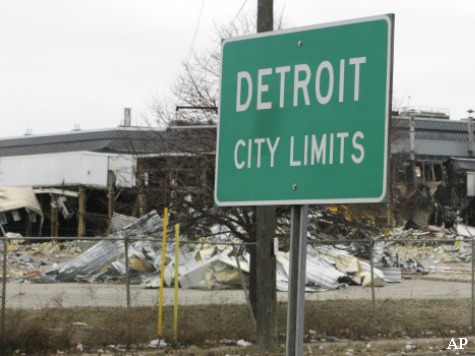Detroit is, quite literally, bankrupt. In fact, they are still in bankruptcy proceedings. Yet in spite of this, they appear to have learned nothing. Hopefully Texans are taking note, so that the Lone Star State does not experience similar problems in the near future.
To see the latest example of Detroit’s dubious deeds, look no further than the city’s public-private venture to create an entertainment district with mixed-use development at a cost of several hundred million dollars.
As part of a larger $650 million project that covers a 45-block area, the Detroit City Council has committed $284.5 million in “public investment” to pay most of the construction costs for a new 650,000 sq. ft. arena for the Detroit Red Wings.
On July 18, 2013, Detroit became the largest city in American history to file for bankruptcy. No one seemed to know exactly how much Detroit owed, but the figure was estimated between $18-20 billion.
Lean times were supposed to be in store as the Motor City figured out how to climb out of the fiscal pit that many years of fiscal irresponsibility and mismanagement had cast it into. As further evidence of how bad things are, the city just received a $120 million emergency loan from Barclays to pay the bills for services, like policing, that it can’t afford to provide otherwise.
And yet, according to the Guardian, only three council members voted against giving $3 million worth of property to the Red Wings’ owner for $1 to kick off the project:
“Half the city’s street lights don’t work; nearly a quarter of the city’s high school students dropped out before graduation last year, while the state dropout rate is one in 10. There were protests ahead of the stadium deal, with locals arguing the money would be better spent elsewhere. Three of the city’s nine council members voted against the sale under the current terms.”
There are no clawback provisions if the Red Wings fail to follow through with a pledged $200 million in private retail, office, and housing development. In other words, the city’s taxpayers are completely and totally on the hook.
It is not as though the city has a good track record when it comes to cutting deals for special interests, either. Detroit gave Marathon Petroleum a special tax deal worth $175 million in 2007, with the idea that Marathon would hire a lot of Detroit residents. But since 2007, they’ve only hired an additional 15 Detroit workers. In other words, each new Detroit job cost the city nearly $11.7 million in lost tax revenue.
While Detroit and its problems seem far away now, Texas localities are making some of the same mistakes that lead down the road to bankruptcy. Texas taxpayers are on the hook for nearly $325 billion dollars in debt, when you add up principal and interest. That’s more than $12,000 per Texan.
This May, school districts in Texas will propose billions of dollars in new debt, and consequentially, end up raising taxes now or in the future to pay for it. Cities around the state are engaged in cutting special deals with private companies, handing out millions of taxpayer dollars in the name of economic development. And many Texas cities, just as Detroit did, have enormous amounts of unfunded pension liabilities.
We should not assume that Texas’ local governments will be alright simply because Texas is doing so well relative to the rest of the nation. We should try to learn from Detroit, and the mistakes that they have consistently made and continue to make.
Sadly, Detroit can’t seem to learn from their own situation.
Einstein said that doing the same thing over and over again expecting a different result is the definition of insanity. Detroit’s fiscal irresponsibility clearly meets the definition. If Texas does not change its big-spending ways at the local level, then someday it, too, might fit Einstein’s definition.
Unfortunately, in Detroit’s case, the consequences are not simply monetary in nature.
Kids growing up in Detroit have to live in the most dangerous city in America because their city officials would rather waste public money on big sports arenas than make investments in the things that cities actually need to provide, like public safety and infrastructure.
Like Clint Eastwood, I hope that Detroit makes a comeback. Its good, hardworking people deserve that. This once-great city can rise again, and America loves underdogs. It could happen.
But if their city officials and bureaucrats keep making the same mistakes over and over again, I wouldn’t hold my breath. At this point and likely in the future, the story of Detroit is a cautionary tale.
Texans must work to ensure that our localities do not rack up enormous debt and waste money on pet projects we cannot afford. Taxpayers should demand that local governments spend money on priorities, like good public safety and sound infrastructure.
Many American cities have gone down that path, and Detroit is but the largest example of what happens when governments spend beyond their means. We should not let it happen in Texas.
Jess Fields is a senior analyst with the Center for Local Governance at the Texas Public Policy Foundation, a nonprofit, free-market research institute based in Austin.

COMMENTS
Please let us know if you're having issues with commenting.